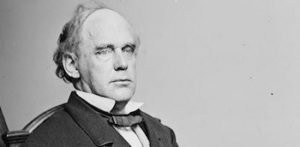
Salmon Chase
Salmon Chase was born on this date in 1808. He was a white-American teacher, abolitionist, lawyer, and judge.
Salmon Portland Chase was born in New Hampshire; his father died when he was nine. His uncle, Philander Chase, a bishop in Ohio, raised him. Young Chase graduated from Dartmouth College in 1826, working briefly as a schoolteacher in Washington. In 1830, he moved to Cincinnati and established himself as a lawyer. It was in the Queen City that he became a member of the Anti-Slavery Society. Chase defended so many re-captured slaves he became known as the “attorney general for runaway Negroes.”
He also gave free legal advice to those caught working for the Underground Railroad. Chase was affiliated with the Whig and the Liberty Party, but in 1848, he and others joined to form the Free-Soil Party. The following year, Chase was elected to the United States Senate and played an important role in the campaign against the Kansas-Nebraska Act.
In 1855 he was elected as the governor of Ohio. He sought the Republican Party presidential nomination in 1860 but, on the third ballot, asked his supporters to vote for Abraham Lincoln. As president, Lincoln appointed Chase as Secretary of the Treasury. He helped to establish a national banking system and began the employment of women clerks. Chase was the most progressive member of Lincoln's Cabinet.
In 1862, Chase and Abraham Lincoln argued over the treatment of General David Hunter. Hunter was enlisting Black soldiers in the occupied districts of South Carolina and had issued a statement that all slaves owned by Confederates in those areas were free. Lincoln was furious and instructed him to break up the 1st South Carolina (African Descent) regiment and withdraw his public statement.
Chase’s main dispute with Lincoln was that the president refused to state that the emancipation of the slaves was an object of the war. In Cabinet meetings, Chase was the only member to argue for Black suffrage. He resigned in 1864, but that same year, Lincoln appointed him as Chief Justice of the Supreme Court. On the bench, Chase was highly critical of Lincoln's Reconstruction Plans and even more of the plans of Andrew Johnson, whose Senate impeachment proceedings he presided over.
As Chief Justice, Chase interpreted the Thirteenth and Fourteenth Amendments to the Constitution to help protect the rights of Blacks from infringement by state action. Salmon Chase died on May 7, 1873.
The Encyclopedia Britannica, Fifteenth Edition.
Copyright 1996 Encyclopedia Britannica Inc.
ISBN 0-85229-633-0